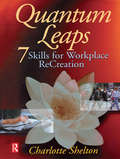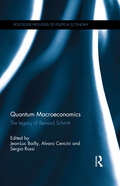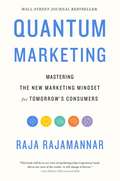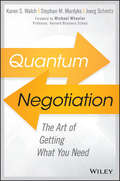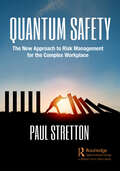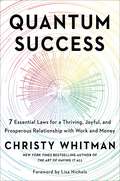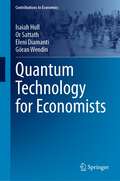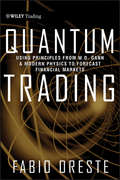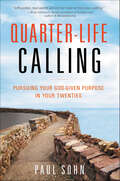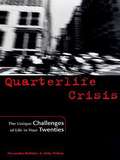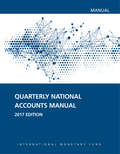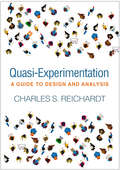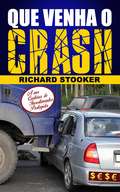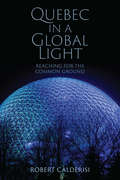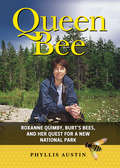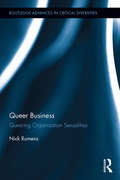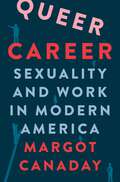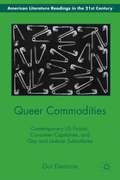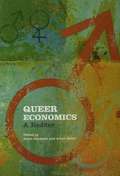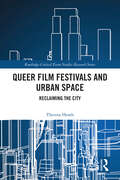- Table View
- List View
Quantum Leaps
by Charlotte SheltonQuantum Leaps is a how-to book for creating fundamental change in both ourselves and our organizations. Charlotte Shelton's basic premise is that organizational change happens one person at a time. Our workplaces simply mirror our individual and collective beliefs. Therefore, we change ourselves, our workplaces, and the world by changing our minds. As our beliefs change, we not only see the world differently, we begin to be in the world in a different way, thus creating a new reality.Shelton uses the basic principles of quantum mechanics as the foundational metaphor for a new quantum skill set that recognizes the highly complex, constantly changing, totally unpredictable nature of life. She demonstrates the inadequacy of our time-honored skills of planning, organizing, directing and controlling. She shows how these skills are directly tied to an obsolete view or reality ignoring the now fundamental requirements of extreme imagination and radical innovation.Quantum Leaps introduces seven new skills: skills that are compatible with life and work in the twenty-first century. These seven Quantum Skills enable us to see, think, feel, know, act, trust and be radically different ways. Collectively they form a comprehensive model for change.These skills integrate quantum mechanical principles, state-of-the-art-psychology, and universal spiritual practices. They balance the traditional left-brain business skills with a new skill set that more fully utilizes both hemispheres of the brain. As we master these skills, Shelton states, "We create balanced lives and whole-brain organizations and we become authentic change masters, changing ourselves and our organizations from the inside out." The Seven Quantum Skills are: Quantum Seeing, Quantum Thinking, Quantum Feeling, Quantum Knowing, Quantum Acting, Quantum Trusting and Quantum Being. These 7 skills introduce a new way to access underutilized brain capacities as they acknowledge the role of intention, intuition and interconnectivity.
Quantum Macroeconomics: The legacy of Bernard Schmitt (Routledge Frontiers of Political Economy)
by Sergio Rossi Alvaro Cencini Jean-Luc BaillyQuantum Macroeconomics presents a new paradigm in macroeconomic analysis initiated by Bernard Schmitt. It explains the historical origin, the analytical contents, and the actual relevance of this new paradigm, with respect to current major economic issues at national and international level. These issues concern both advanced and emerging market economies, referring to inflation, unemployment, financial instability, and economic crises. In the first part of this volume, leading scholars explain the historical origin and analytical content of quantum macroeconomics. The second part explores its relevance with respect to the current major economic issues such as the sovereign debt crisis and European monetary union. The volume also features two previously unpublished papers by Bernard Schmitt. The main findings of this book concern the need to go beyond agents’ behaviour to understand the structural origin of a variety of macroeconomic problems, notably, inflation, unemployment, financial instability, and economic crises. The originality that pervades all contributions is plain, when one considers the lack of any structural explanation of national and international economic disorders in the literature within the mainstream approach to economics. This edited volume is of great interest to those who study macroeconomics, monetary economics and money and banking.
Quantum Marketing: Mastering the New Marketing Mindset for Tomorrow's Consumers
by Raja RajamannarRaja Rajamannar, Chief Marketing Officer of Mastercard, shares breakthrough, frontier strategies to navigate the challenges marketers face to thrive in a modern business world that is changing with unprecedented speed and disruption.As technology has continually evolved in the last several decades, marketing has had to change with it, evolving through four significant stages that build on the strategies and tools of the previous era. What happens next in the fifth stage, or Fifth Paradigm, will not be an evolution, but a revolution. Almost everything about how marketing is done today, including the very notion of a brand itself, will require a complete re-imagination.As Chief Marketing Officer of Mastercard—one of the world&’s most recognizable and decorated brands—Raja Rajamannar shares the forward-thinking ways all businesses must rethink their entire marketing landscape to remain relevant and be successful.Readers will:Understand the evolution of marketing and how to be at the forefront of future change.Get clarity on the right marketing strategies and tactics to pursue amidst an ever-evolving industry.Achieve breakthroughs in innovative thinking in order to compete in modern business.Gain perspective from top marketers across industries. Quantum Marketing is for all business people who seek to understand how rapidly marketing is evolving, what some of the smartest people in the discipline are doing to get ready for this dramatic shift, and what the new world will look like for companies, consumers, and society at large as the race to develop revolutionary marketing strategies reaches a whole new level.
Quantum Models of Cognition and Decision
by Jerome R. Busemeyer Peter D. BruzaMuch of our understanding of human thinking is based on probabilistic models. This innovative book by Jerome R. Busemeyer and Peter D. Bruza argues that, actually, the underlying mathematical structures from quantum theory provide a much better account of human thinking than traditional models. They introduce the foundations for modelling probabilistic-dynamic systems using two aspects of quantum theory. The first, 'contextuality', is a way to understand interference effects found with inferences and decisions under conditions of uncertainty. The second, 'quantum entanglement', allows cognitive phenomena to be modeled in non-reductionist ways. Employing these principles drawn from quantum theory allows us to view human cognition and decision in a totally new light. Introducing the basic principles in an easy-to-follow way, this book does not assume a physics background or a quantum brain and comes complete with a tutorial and fully worked-out applications in important areas of cognition and decision.
Quantum Negotiation: The Art of Getting What You Need
by Michael Wheeler Joerg Schmitz Stephan M. Mardyks Karen S. WalchMaster the art of getting what you need with a more collaborative approach to negotiation Quantum Negotiation is a handbook for getting what you need using a mindset and behaviors based on a refreshingly expansive perspective on negotiation. Rather that viewing every negotiation as an antagonistic and combative relationship, this book shows you how to move beyond the traditional pseudo win-win to construct a deal in which all parties get what they need. By exploring who we are as negotiators in the context of social conditioning, this model examines the cognitive, psychological, social, physical, and spiritual aspects of negotiation to help you produce more sustainable, prosperous, and satisfying agreements. We often think of negotiation as taking place in a boardroom, a car dealership, or any other contract-centered situation; in reality, we are negotiating every time we ask for something we need or want. Building more robust negotiation behaviors that resonate beyond the boardroom requires a deep engagement with others and a clear mindset of interdependence. This book helps you shift your perspective and build these important skills through a journey of discovery, reflection, and action. Rethink your assumptions about negotiations, your self-perception, your counterpart, and the overall relationship Adopt new tools that clarify what you want, why you need it, and how your counterpart can also get what they want and need Challenge fundamental world views related to negotiation, and shift from adversarial to engaging and satisfying Understand the unseen forces at work in any negotiation, and prevent them from derailing your success In the interest of creating an environment that elevates everyone’s participation and assists them in reaching their full potential, Quantum Negotiation addresses the reality of hardball and coercion with a focus on engaging the human spirit to create new opportunities and resources.
Quantum Safety: The New Approach to Risk Management for the Complex Workplace
by Paul StrettonThis book is the most comprehensive review of health and safety in half a century. Most organisational approaches to health and safety are based on the methodology developed during the 1970s, and despite the workplace changing beyond recognition since that time, these approaches have remained untouched. Quantum Safety will develop a new understanding fit for the modern workplace. Quantum Safety is an approach that is part of the "new view" debate. There have been a number of other new approaches to health and safety in recent years, and while they all have merit and improve understanding to help create the optimal, safe working environment, they have failed to significantly create the change desired. These approaches are often flawed at the philosophical or conceptual level or propose a solution without a pathway to implement the principles in safety-critical environments. Quantum Safety: The New Approach to Risk Management for the Complex Workplace is founded on a wholesale critical analysis of the conceptual foundations of health and safety before translating the revised principles into a tangible methodology. Central to the development of Quantum Safety is the application of Complexity Science. The traditional approach to health and safety is considered to be Newtonian – it uses linear models and deterministic analysis. Quantum Safety, due to the full consideration of Complexity Science, introduces multidimensional models and develops analysis based on probabilities. Crucially, this does not render Newtonian methodologies as worthless – in the same manner that Newtonian physics was able to take mankind to the moon, but required the quantum understanding within computers to make it possible – Quantum Safety provides the mechanisms to complete organisations’ safety-based journeys. The new mechanisms are fully developed for the reader at both macro and micro levels. How an organisation measures safety and what it values are reset and re-examined. How we investigate adverse events and the consequential actions taken with employees to develop a true Just Culture within a high-performing culture are also completely revised. Essentially, Quantum Safety creates a pathway for understanding health and safety in the complex modern world. To achieve that, new models are introduced to replace the dated, simple tools and a new language is developed to communicate this powerful approach. It will help propel an organisation from considering safety within a concept of industrialised failure avoidance to valuing safety as an integrated aspect of high performance.
Quantum Safety: The New Approach to Risk Management for the Complex Workplace
by Paul StrettonThis book is the most comprehensive review of health and safety in half a century. Most organisational approaches to health and safety are based on the methodology developed during the 1970s, and despite the workplace changing beyond recognition since that time, these approaches have remained untouched. Quantum Safety will develop a new understanding fit for the modern workplace. Quantum Safety is an approach that is part of the "new view" debate. There have been a number of other new approaches to health and safety in recent years, and while they all have merit and improve understanding to help create the optimal, safe working environment, they have failed to significantly create the change desired. These approaches are often flawed at the philosophical or conceptual level or propose a solution without a pathway to implement the principles in safety-critical environments. Quantum Safety: The New Approach to Risk Management for the Complex Workplace is founded on a wholesale critical analysis of the conceptual foundations of health and safety before translating the revised principles into a tangible methodology. Central to the development of Quantum Safety is the application of Complexity Science. The traditional approach to health and safety is considered to be Newtonian – it uses linear models and deterministic analysis. Quantum Safety, due to the full consideration of Complexity Science, introduces multidimensional models and develops analysis based on probabilities. Crucially, this does not render Newtonian methodologies as worthless – in the same manner that Newtonian physics was able to take mankind to the moon, but required the quantum understanding within computers to make it possible – Quantum Safety provides the mechanisms to complete organisations’ safety-based journeys. The new mechanisms are fully developed for the reader at both macro and micro levels. How an organisation measures safety and what it values are reset and re-examined. How we investigate adverse events and the consequential actions taken with employees to develop a true Just Culture within a high-performing culture are also completely revised. Essentially, Quantum Safety creates a pathway for understanding health and safety in the complex modern world. To achieve that, new models are introduced to replace the dated, simple tools and a new language is developed to communicate this powerful approach. It will help propel an organisation from considering safety within a concept of industrialised failure avoidance to valuing safety as an integrated aspect of high performance.
Quantum Success: 7 Essential Laws for a Thriving, Joyful, and Prosperous Relationship with Work and Money
by Christy WhitmanIn the bestselling tradition of The Secret, learn how to use the law of attraction for your career to access greater financial success and fulfillment in this positive, detailed guide from celebrated life coach and New York Times bestselling author of The Art of Having It All, Christy Whitman.Whether your vision of an ideal career is starting your own business, rising to a different position within your current company, or landing your very first job, Quantum Success will help you make the prosperity and fulfillment of your dreams a reality. Through her accessible, empowering writing, Christy Whitman shares the fundamental principles that she&’s discovered after more than twenty years of studying universal forces—such as polarity, alignment, resonance, momentum, and magnetism—and explains how to harness these forces to optimize your wealth and career. Exemplified by numerous case studies, Christy&’s ten-step plan teaches you how to establish inner relationships with future clients, associates, and employees, work with light and energy to magnetize opportunities and resources, build a culture of value and appreciation that brings out the very best in those around you, and operate at your highest capacity. By mastering this process, you will enable yourself to achieve unimaginable success in your career, however you define it.
Quantum Technology for Economists (Contributions to Economics)
by Isaiah Hull Göran Wendin Or Sattath Eleni DiamantiThis book offers an introduction to quantum technology that is specifically tailored to economists, students of economics, and professionals in the financial and payments industries. The book reviews quantum speedups that have been identified for algorithms used to solve and estimate economic models, including function approximation, linear systems analysis, graphical modeling, Monte Carlo simulation, matrix inversion, principal component analysis, linear regression, dynamic programming, interpolation, numerical differentiation, and true random number generation. It also provides an overview of quantum financial technology and its potential applications in economics and finance. Written by an interdisciplinary team with backgrounds in economics, computer science, and physics, this book offers a valuable guide for researchers and practitioners who want to understand the implications and possibilities of quantum technology for the field of economics.
Quantum Trading
by Fabio OresteA cutting-edge guide to quantum trading Original and thought-provoking, Quantum Trading presents a compelling new way to look at technical analysis and will help you use the proven principles of modern physics to forecast financial markets. In it, author Fabio Oreste shows how both the theory of relativity and quantum physics is required to makes sense of price behavior and forecast intermediate and long-term tops and bottoms. He relates his work to that of legendary trader W. D. Gann and reveals how Gann's somewhat esoteric theories are consistent with his applications of Einstein's theory of relativity and quantum theory to price behavior. Applies concepts from modern science to financial market forecasting Shows how to generate support/resistance areas and identify potential market turning points Addresses how non-linear approaches to trading can be used to both understand and forecast market prices While no trading approach is perfect, the techniques found within these pages have enabled the author to achieve a very attractive annual return since 2002. See what his insights can do for you.
Quantum Variational Calculus
by Agnieszka B. Malinowska Delfim F. M. TorresThis Brief puts together two subjects, quantum and variational calculi by considering variational problems involving Hahn quantum operators. The main advantage of its results is that they are able to deal with nondifferentiable (even discontinuous) functions, which are important in applications. Possible applications in economics are discussed. Economists model time as continuous or discrete. Although individual economic decisions are generally made at discrete time intervals, they may well be less than perfectly synchronized in ways discrete models postulate. On the other hand, the usual assumption that economic activity takes place continuously, is nothing else than a convenient abstraction that in many applications is far from reality. The Hahn quantum calculus helps to bridge the gap between the two families of models: continuous and discrete. Quantum Variational Calculus is self-contained and unified in presentation. It provides an opportunity for an introduction to the quantum calculus of variations for experienced researchers but may be used as an advanced textbook by graduate students and even ambitious undergraduates as well. The explanations in the book are detailed to capture the interest of the curious reader, and complete to provide the necessary background material needed to go further into the subject and explore the rich research literature, motivating further research activity in the area.
QuantumScape's Mission to Revolutionize Energy Storage for a Sustainable Future
by William A. Sahlman Allison M. Ciechanover Jeff HuizingaQuantumScape CEO Jagdeep Singh juggles the many activities required to lead the next-generation battery pioneer. Founded in 2010, QuantumScape's mission was to develop new "solid-state" car batteries that would improve upon traditional lithium-ion batteries in key areas such as range, charging speed, durability, cost, and safety. Success, they believed, would accelerate the transition from gasoline-powered cars to electric vehicles. Between 2010 and late 2020, QuantumScape operated in stealth mode and raised venture financing totaling more than $800 million. The team grew to over 200 employees, nearly all scientists and engineers working on the technical challenges associated with creating a solid-state battery that could be produced at scale. By summer 2020 it was clear to Singh and the board that the company required more capital to help fund its commercialization plan. In November 2020, QuantumScape went public by merging with a Special Purpose Acquisition Company (SPAC). Now, with that capital in hand, production facilities under construction, and a signed joint venture with Volkswagen, Singh expected to see cars with its batteries on highways by 2025.
Quarter-Life Calling: Pursuing Your God-Given Purpose in Your Twenties
by Paul SohnA young leadership expert guides fellow Christian Millennials on their quest to live and work meaningfully.Even though he seemed to have achieved it all, including landing his dream job at a Fortune 500 company, throughout his twenties Paul Sohn struggled with feelings of inadequacy, emptiness, and disillusionment. Something was very wrong. Finally at twenty-eight, after much contemplation and a life-changing encounter with his mentor, Paul traded in his high-paying job and sought a more meaningful life. Now, having achieved a sense of happiness and fulfillment like never before, and after examining all that he has learned along the way, Paul wants to help young adults avoid the pitfalls he succumbed to, including madly chasing empty financial success. His goal is to help others pursue their God-given purpose, and in Quarter-Life Calling, he shares enlightening biblical insights and practical ways to make it happen.
Quarterlife Crisis
by Alexandra Robbins Abby WilnerWhile the midlife crisis has been thoroughly explored by experts, there is another landmine period in our adult development, called the quarterlife crisis, which can be just as devastating. When young adults emerge at graduation from almost two decades of schooling, during which each step to take is clearly marked, they encounter an overwhelming number of choices regarding their careers, finances, homes, and social networks. Confronted by an often shattering whirlwind of new responsibilities, new liberties, and new options, they feel helpless, panicked, indecisive, and apprehensive. Quarterlife Crisis is the first book to document this phenomenon and offer insightful advice on smoothly navigating the challenging transition from childhood to adulthood, from school to the world beyond. It includes the personal stories of more than one hundred twentysomethings who describe their struggles to carve out personal identities; to cope with their fears of failure; to face making choices rather than avoiding them; and to balance all the demanding aspects of personal and professional life. From "What do all my doubts mean?" to "How do I know if the decisions I'm making are right?" this book compellingly addresses the hardest questions facing young adults today. .
Quarterly National Accounts Manual: Concepts, Data Sources, And Compilation
by International Monetary FundA report from the International Monetary Fund.
Quasi-Experimentation: A Guide to Design and Analysis (Methodology in the Social Sciences)
by Charles S. ReichardtFeaturing engaging examples from diverse disciplines, this book explains how to use modern approaches to quasi-experimentation to derive credible estimates of treatment effects under the demanding constraints of field settings. Foremost expert Charles S. Reichardt provides an in-depth examination of the design and statistical analysis of pretest–posttest, nonequivalent groups, regression discontinuity, and interrupted time-series designs. He details their relative strengths and weaknesses and offers practical advice about their use. Comparing quasi-experiments to randomized experiments, Reichardt discusses when and why the former might be a better choice than the latter in the face of the contingencies that are likely to arise in practice. Modern methods for elaborating a research design to remove bias from estimates of treatment effects are described, as are tactics for dealing with missing data and noncompliance with treatment assignment. Throughout, mathematical equations are translated into words to enhance accessibility. Adding to its discussion of prototypical quasi-experiments, the book also provides a complete typology of quasi-experimental design options to help the reader craft the best research design to fit the circumstances of a given study.
Quasi-Fiscal Operations of Public Financial Institutions
by Peter Stella G. A. MackenzieCentral banks and other public financial institutions act as agents of fiscal policy in many countries. Their quasi-fiscal operations and activities can affect the overall public sector balance without affecting the budget deficit as conventionally measured, may also have important allocative effects, and increase the effective size of the public sector. This paper analyzes the macroeconomic and financial effects of such quasi-fiscal activities, as well as the taxes, subsidies, and other expenditures that such activities introduce outside the budget. Measurement and accounting issues are addressed, and policy recommendations are offered.
Que venha o crash!
by Richard Stooker João Campos MonteiroO dólar americano oscila à beira da catástrofe. Pela primeira vez na história, a dívida do governo mais poderoso da Terra, que lidera a maior economia do mundo, foi baixada pela Standard & Poors de um Perfeito Triplo AAA para AA. A arrogância política dos Republicanos e Democratas sobre o teto da dívida, fez com que muitos americanos e outras pessoas à volta do mundo duvidassem da nossa liderança. E muita gente acha que o acordo final não foi tão longe quanto deveria ter ido, na redução dos gastos do governo. A dívida do governo dos EUA é agora igual ao Produto Interno Bruto (PIB). A crise financeira de 2007-2009, parece ter sido o primeiro passo em direção a uma depressão deflacionária, que poderia destruir as economias de três gerações de americanos. Estivemos tecnicamente a "recuperar" desde março de 2009, mas, apesar de todas as ações do governo e do Fed para estimular a economia dos EUA, o desemprego continua teimosamente acima de 9%. É esta a previsão, a não ser que a quantidade maciça de dinheiro injetada pelo governo, desencadeie uma onda de hiperinflação. O dólar dos EUA atingiu recentemente novos mínimos face ao iene japonês e ao franco suíço, apesar das massivas intervenções dos bancos centrais dos dois países. A China alienou 97% das suas participações de títulos do Tesouro dos EUA de curto prazo. Isto aconteceu em março de 2011, muito antes da baixa de notação atual. A China ainda detém muitos bilhões de dólares de títulos do Tesouro de longo prazo dos EU e está claramente preocupada com o futuro. Estão a montar um grande espetáculo de apoio à economia Europeia, para que assim tenham uma alternativa ao dólar norte-americano. O que se está a passar connosco, para que o maior país comunista na Terra tenha que nos dar lições sobre a forma de gerir a nossa moeda? Se esses países começassem a vender dólares norte americanos em vez de
Quebec in a Global Light: Reaching for the Common Ground (Munk Series on Global Affairs)
by Robert CalderisiTo the outside world, Quebec is Canada’s most distinctive province. To many Canadians, it has sometimes seemed the most troublesome. But, over the last quarter century, quietly but steadily, it has wrestled successfully with two of the West’s most daunting challenges: protecting national values in the face of mass immigration and striking a proper balance between economic efficiency and a sound social safety net. Quebec has also taken a lead in fighting climate change. Yet, many people – including many Quebeckers – are unaware of this progress and much remains to be done. These achievements, and the tenacity that made them possible, are rooted in centuries of adversity and struggle. In this masterful survey of the major social and economic issues facing Quebec, Robert Calderisi offers an intimate look into the sensitivities and strengths of a society that has grown accustomed to being misunderstood. In doing so, he argues that the values uniting Quebeckers – their common sense, courtesy, concern for the downtrodden, aversion to conflict, and mild form of nationalism, linked to a firm refusal to be homogenized by globalization – make them the most "Canadian" of all Canadians.
Queen Bee: Roxanne Quimby, Burt's Bees, and Her Quest for a New National Park
by Phyllis AustinIn this fascinating biography of the woman behind the wildly successful line of natural skin care products known as Burt's Bees, veteran journalist Phyllis Austin provides insight into Roxanne Quimby s background, her determination, and her desire to protect Maine s wilderness by establishing a national park in the north woods. Born in Massachusetts, Roxanne Quimby made herself a success. She changed a roadside honey stand into a juggernaut company worth hundreds of millions of dollars before selling it to Clorox in 2007. She then turned her attention to her longstanding interest: conservation. Quimby has purchased more than 120,000 acres of Maine forest to preserve it. Not everyone in the Katahdin region welcomed Quimby s efforts with open arms, and this well-researched book chronicles the ups and downs of Roxanne s quest for a national park in a way no other book has.
Queer Business: Queering Organization Sexualities (Routledge Advances in Critical Diversities)
by Nick RumensIn this modern day and age, it is surprising that managerialist perspectives, practices and ideas are colonising the study of sexualities in organisation. A timely intervention into the contemporary vitality of queer theories, Queer Business is an innovative book length exploration of how queer theory has been used in management and organisation studies, with the aim of broadening and deepening queer scholarship in this discipline. Through both scholarly and original empirical research, Rumens also seeks to demonstrate how queer theory has been mobilised in MOS and how it might be advanced in a field where it has yet to become exhausted and clichéd. In particular, this volume shows how scholars can use queer theory concepts to explore how lesbian, gay, bisexual and transgender sexualities and genders are understood and experienced in the workplace. Challenging notions of LGBT+ inclusivity in the workplace through concepts such as queer liberalism and homonormativity, Queer Business will appeal to scholars, undergraduate and postgraduate students and postdoctoral researchers interested in fields such as management and organisation studies, queer studies, gender studies, sexuality studies, organisational theory and cultural studies.
Queer Career: Sexuality and Work in Modern America
by Margot CanadayA masterful history of the queer workforce in AmericaWorkplaces have traditionally been viewed as &“straight spaces&” in which queer people passed. As a result, historians have directed limited attention to the experiences of queer people on the job. Queer Career rectifies this, offering an expansive historical look at sexual minorities in the modern American workforce. Arguing that queer workers were more visible than hidden and, against the backdrop of state aggression, vulnerable to employer exploitation, Margot Canaday positions employment and fear of job loss as central to gay life in postwar America.Rather than finding that many midcentury employers tried to root out gay employees, Canaday sees an early version of &“don&’t ask / don&’t tell&”: in all kinds of work, as long as queer workers were discreet, they were valued for the lower wages they could be paid, their contingency, their perceived lack of familial ties, and the ease with which they could be pulled in and pushed out of the labor market. Across the socioeconomic spectrum, they were harbingers of post-Fordist employment regimes we now associate with precarity. While progress was not linear, by century&’s end some gay workers rejected their former discretion, and some employers eventually offered them protection unattained through law. Pushed by activists at the corporate grass roots, business emerged at the forefront of employment rights for sexual minorities. It did so, at least in part, in response to the way that queer workers aligned with, and even prefigured, the labor system of late capitalism.Queer Career shows how queer history helps us understand the recent history of capitalism and labor and rewrites our understanding of the queer past.
Queer Commodities
by Guy DavidsonQueer Commoditiesis the first book-length analysis of same-sexuality and consumer capitalism in contemporary US fiction. Moving beyond the critical tendencies to identify gay and lesbian subcultures as either hopelessly immersed in consumer capitalism or heroically resistant to it, Guy Davidson argues that while these subcultures are necessarily commodified, they also provide means of subversively negotiating aspects of life under capitalism.
Queer Economics: A Reader
by Joyce Jacobsen Adam ZellerAn important new book, bringing together into one volume many of the salient early articles in the field as well as important recent contributions, this reader is an examination of and response to the effects of heteronormativity on both economic outcomes and economics as a discipline. The first book to consolidate what has been published, filling a gap in the currently available literature and edited by an expert in the field, it contains a brief introductory essay; setting-out the reasons for and aims of the project, and a short section introduction; defining the topic at hand and introducing each of the key readings. This book is necessary reading for students in research areas including political economy, urban studies, economics, economic history and demographic economics.
Queer Film Festivals and Urban Space: Reclaiming the City (Routledge Critical Event Studies Research Series.)
by Theresa HeathThis timely and innovative book argues that queer film festivals reclaim urban space for queer women and other marginalised queer subjects through the mobilisation of both material and diegetic space.It is a response to the loss of queer urban venues and community spaces across across many parts of the Global North and a claim for the political potential of queer film festivals in the context of late-stage capitalism. Drawing from critical events studies, film and film festival scholarship, archival research, cultural geography, and research in the creative industries, the book deploys an interdisciplinary arsenal of tools in order to understand the complexity of festival space. Covering the period from 1980 to the present, the volume posits original case studies of two long-running festivals, as well as analysis of ephemeral, grassroots events. This thorough and critical exploration offers significant insight into the strategies deployed by queer film festivals to carve out queer geographies in the city, and the potential of event-driven place-making to construct alternative morphologies and more equitable approaches to urban space.This volume will be of pivotal interest to students, scholars, and academics of critical event and festival studies, film and film festival studies, cultural, creative, and media industries, cultural geography, sociology, and urban studies, as well as those with an interest in these areas more generally.
